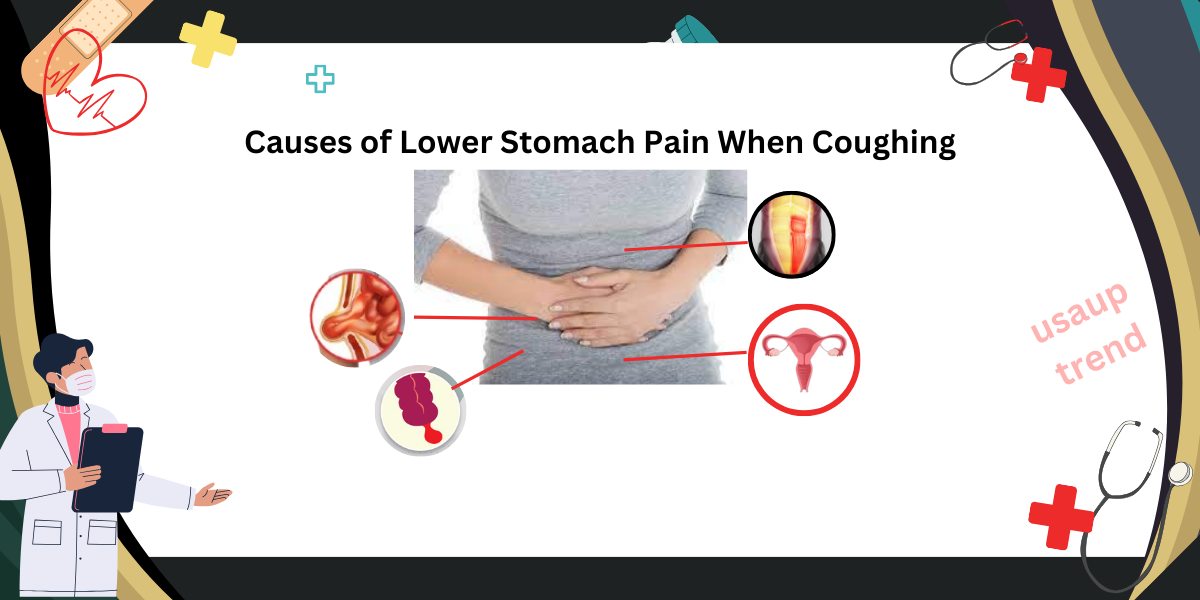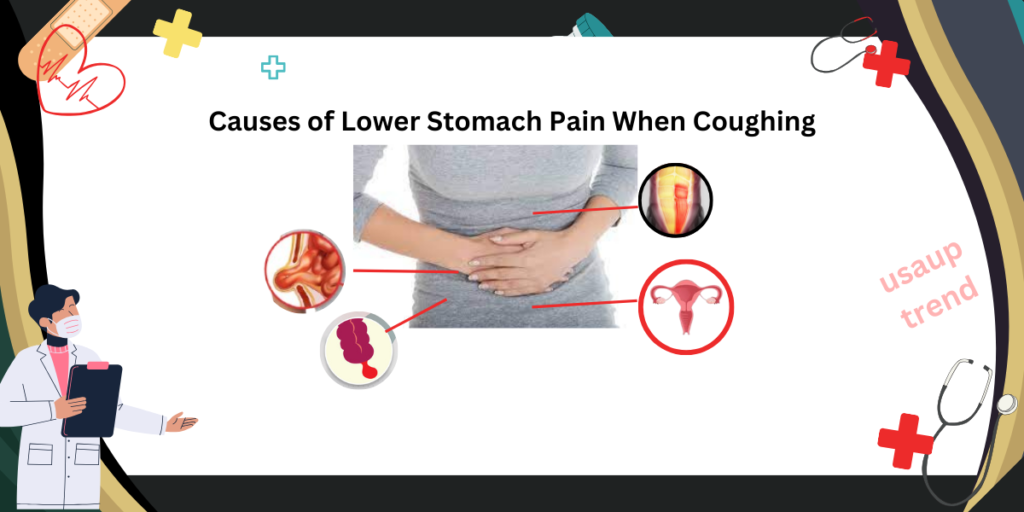
Lower stomach pain when coughing is painful and at times worrying. Such kind of pain will always come with questions on its causative factors, especially if it persists or becomes severe. Coughing is one of the normal responses that the body provides in response to irritants within the throat. Its occurrence with lower abdominal pain results from several causative factors. We will discuss the possible causes of lower stomach aches. While coughing, symptoms to look out for, some remedies, and when to see a physician.
Causes of Lower Stomach Pain When Coughing
It could range from a minor muscle strain to medical conditions. Common causes include:
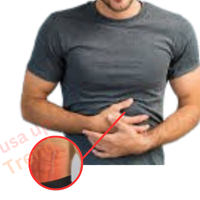
Muscle Strain
This can be a tiring work especially for the abdominal muscles because one tends to strain over. Such an abdominal area where this muscle exists. Heavy and chronic coughs typically make the abdominal muscles tenser. Thereby causing an aching or sharp stitch at the lower abdomen part of the abdominal wall. Many people suffer from muscular tension due to chronic cough associated with chronic respiratory disorders or prolonged illnesses. These muscles are often localized so worsen as you would whenever you cough, sneeze, or just laugh.
Hernia
A hernia is a way of saying that an organ, such as part of the intestine, pushes outward, out of a weakened body wall. Commonly at weak points in the abdominal cavity. This normally produces low stomachache and becomes much worse in nature. If you cough when the increased pressure is transmitted onto the hernia. Those who have this medical condition will also probably notice a bulge developing at the affected area. Which continues to grow more bulgy with efforts or even coughing. All hernias are treated medically because it doesn’t heal and often becomes worse with time.
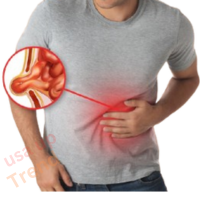

Appendicitis
Appendicitis is an inflammatory disease of the appendix causing intense lower abdominal pain. That progresses in case the patient moves about or coughs. Generally, the pain starts round the navel and is gradually displaced to the lower right abdomen. The patient becomes feverish, starts vomiting, and loses their appetite as well. This is a very serious disease condition that needs immediately surgical interventions.
(PID) Pelvic Inflammatory Disease
Lower stomach pain when coughing, which may develop to infect the female reproduction organs. The disease mostly results from sexually transmitted bacteria and characterized by some pain in the lower abdominal region. Some common symptoms of PID, among others, include unusual discharges in the vagina, fever. The inability to copulate in some cases.
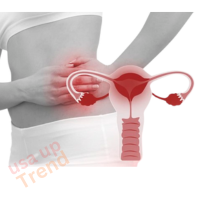
How Coughing Relates to Pain in the Lower Abdomen
Pressure in the abdomen because of cough compresses the inner structures mainly located in the lower portion of the stomach. Continued coughing results in sustained pressure that causes irritation or strain to the abdominal muscle and tissues that lie below. Thus creating pain or sharp tenderness in the area and worsening conditions. Like muscle strain hernia or other abdominal problems with coughing.
Repeated attempts to cough will also stifle the blood flow across that area. An unconscious spasm of all abdominal muscles can cause them to pull in tighter. Thus making the pain worse in case the person has underlying medical conditions such as having a hernia. There is the possibility of intruding this internal organ any further outside thus causing immense pain.
Over-the-Counter Remedies to Help with Lower Stomach Pain When Coughing
If you perceive that your lower abdominal ache due to coughing is not severe. You have several over-the-counter at-home remedies that will reduce your pain. You should try these solutions:
- Rest and Avoid Heavy Lifting: As long as the cause is strain in the muscles. A person needs to rest and avoid heavy lifting so as to give muscles time to heal.
- Apply Heat or Cold Packs: Sometimes, heat or cold compress or ice pack is helpful in reducing the pain and edema at the site.
- Stay Hydrated: Hydration-Sufficient water intake can dilute the mucus, reduce the frequency and severity of coughing. Thereby lessen abdominal stress.
- Use Cough Suppressants: Over-the-counter medications to suppress cough can reduce the frequency and greatly reduce abdominal pressure.
- Practice Gentle Breathing Exercises: Deep breathing can be useful in coping with coughing fits. And reduce the effects on your abdominal muscles.
When to See a Doctor
Most mild lower stomach pain when coughing can be treated at home. But there are times when medical attention is very much needed. Pain that is acute or very severe requires seeking a healthcare provider. When signs such as fever, vomiting, or swelling in the abdomen appear. Such conditions as hernias and appendicitis must be seen by a doctor to avoid complications. Do not ignore any pain that lasts or is very severe.
Preventive Measures to Decrease Cough Stomach Pain
A few preventive tips can reduce the cases of lower stomach pain when coughing. These include, most of all:
- Healthy Diet: Proper dieting keeps the muscle healthy and reduces the chances of a hernia.
- Core Strengthening: Muscles in the abdominal region help to support the stomach. Therefore, during coughing moments that region will bear lesser stress.
- Smoking and Irritants Avoidance: If a person smokes or lives in a place where air pollution is immense. Then they tend to generate more severe problems in cough and breathing conditions. Chronic Cough may lead to some chronic episodes of cough fits.
- Stay Active : Exercise regularly will increase Lung Expansion, in general; respiratory conditions, and reduce chronic bouts of cough fit.
- Maintain good posture: Shallow breathing is more likely to stress the abdominal muscles. Thereby develop a risk of stomach pain while coughing.
Here’s a historical table that outlines the understanding, medical advancements, and diagnostic practices related to lower stomach pain when coughing:
| Time Period | Key Medical Understanding | Diagnostic & Treatment Advancements | Notable Practices & Beliefs |
| Ancient Times | Early medical records (Egypt, Greece, Rome) recognized abdominal pain but didn’t link it to coughing. | Focus on herbal remedies, rest, and basic surgical techniques. | Belief that pain was caused by imbalances in bodily humors or spirits. |
| Middle Ages (500-1500 AD) | Coughing and stomach pain often associated with “bad air” or imbalances. | Bloodletting and leeching were common practices for pain relief. | Religious practices, such as prayers, used to address pain. |
| Renaissance (1300-1600s) | Early anatomy studies begin to distinguish causes of pain in different areas of the body. | Autopsies and anatomical study improved understanding of hernias and appendicitis. | Herbal remedies like ginger and licorice for coughing and pain relief. |
| 18th Century | Physicians linked coughing to abdominal pressure, noting how it could cause pain. | Advancements in surgery enabled basic hernia operations. | Focus on reducing symptoms with bed rest and tonics. |
| 19th Century | Recognized relationship between respiratory issues and abdominal strain. | Better surgical instruments and antiseptics improved safety of hernia repair. | Diet changes and hot compresses recommended for cough-related pain. |
| Early 20th Century | Understanding of muscle strain, hernias, and appendix inflammation refined. | Use of X-rays and early antibiotics enhanced diagnosis and treatment. | Hospitals began recommending physical therapies for muscle strain. |
| Mid 20th Century | Awareness grew around coughing as a cause of muscle strain and pressure on hernias. | Ultrasound and improved imaging techniques improved accuracy in diagnosing hernias and appendicitis. | Core exercises and avoiding heavy lifting advised for abdominal health. |
| Late 20th Century | Studies highlighted the role of chronic cough in abdominal muscle strain. | Laparoscopic surgery for hernia and appendix issues became common. | Cough management became more advanced with targeted medications. |
| Early 21st Century | Links between chronic coughing and abdominal health widely recognized. | Development of minimally invasive procedures and better pain management. | Emphasis on core strengthening, posture, and preventive health practices. |
| Present Day | Detailed understanding of cough-related abdominal pain across various conditions. | Advanced diagnostic imaging (CT, MRI) and precise laparoscopic surgery. | Focus on lifestyle adjustments, cough suppressants, and preventive care. |
This historical progression shows how medical understanding of lower stomach pain. When coughing has evolved from general observations to detailed knowledge and advanced treatments, providing improved patient outcomes today.
FAQ’s
Q1. Does coughing cause chronic lower stomach pain?
Yes, chronic or severe coughing may cause continued abdominal pain. If it strains the muscles or exacerbates the condition, for example, a hernia.
Q2. Why would my lower abdomen hurt when I cough?
Most of the times, pain results from straining at the abdominal muscles or strain at a weak spot. Due to pressure such as around the location of a hernia, or it can be appendicitis and pelvic inflammation.
Q3.How will I know if my abdominal pain is serious?
Consult a health care professional if pain is sharp, intense, or prolonged to several days, with signs. Such as fever, nausea, and swelling in the abdominal region..
Q4. How would one relief reduce stomach ache due to coughing?
Rest, rehydration, applying hot or cold packs. And using available over-the-counter cough medicines can be done to achieve relief from the pain. If it’s not relieved, consult a physician for further assistance.
Q5. Do muscle strains from coughing improve with time?
Yes. Muscle strains due to coughing often resolve with appropriate rest and avoiding further irritation of the muscles. But if the pain does not subside or even becomes worse, then a professional evaluation is in order.
To read our more interesting blogs on health click here.
